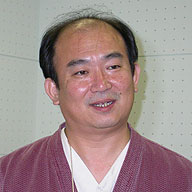An Interview with Kim Dong-won
I’d Like to Regard “Asian Value” as Important

Q: First, what were your thoughts on jurying?
KD: Evaluation itself seemed impossible given the rich variety of trends within the New Asian Currents program, so there was the difficulty of having to do the impossible.
For example, the title for the program is “New Asian Currents.” There were many different possibilities depending on whether you emphasize “New,” “ Asian,” or “Currents,” but I personally regarded “Asian value” as important. Of course works with worldwide universality and value that enable them to be accepted in any country are also important. This gets a little abstract, but I’d like to emphasize discovering an Asian value in social critiques, or works that are resisting something. If there is a single “world order,” for me works with “Asian value” try and “resist” this order, not accept things like they are.
I think fundamentally there are a lot of similarities between your perspective and way of thinking when you shoot a film and when you jury a film. Oddly enough I go to jury with my own ideas, but there’s discord and my ideas change as I deliberate with other jurors, and I think it’s also possible that when I open the lid the results could be unexpected, different from my original ideas. It was tough to evaluate the works using just my own standards, as I’d intended when I approached jurying.
Q: You participated in YIDFF ’91 and ’99, but what are your thoughts on changes in Asian documentaries over the past twelve years?
KD: Unfortunately I haven’t been able to attend each YIDFF, but after getting to see a variety of works this time it seems like new trends are being born within documentaries. In 1991 things stopped with just facts or recording what happened. But I feel like recently filmmakers have been moving beyond simply recording and are thinking deeply and turning their attention to how they should face their subjects and present their work to audiences.
Another thing is I think there has been a tremendous increase in strongly individualistic and subjective works. A striking change during the past decade is there are fewer filmmakers making documentaries with an activist attitude, especially Japanese works. For example, I think there are more works with the tendencies symbolized in Go! Go! fanta-G (dir. Shimizu Hiroyuki, 2001), with its unconventional and in a sense prankish means of expression. I view this kind of change positively, not like it’s necessarily bad, but on the other hand I felt like the delivery has gotten kind of weak.
The spread of DV cameras and non-linear editing systems is having an impact on these kinds of trends. We’re in an age where everything is getting digitized, and in an environment like this it’s only natural to have more works with individualistic and subjective content. Also, before only things that “exist” were shot, but now it’s possible to express even invisible things that don’t exist. Because you can do a lot if you play with the computer. I think works displaying the imagination of young filmmakers are being made precisely because of the age we’re in. Changes in hardware have changed content and even ways of approaching subject matter, and it seems even the concept of “what is a documentary” is in the process of changing.
Q: The New Asian Currents award is called the Ogawa Shinsuke Prize, but was this something you kept in mind as a juror?
KD: Not directly, but I think my own works have tendencies similar to Ogawa’s works, and I respect Ogawa, so did have the feeling of trying to select something appropriate to his name. But one thing I think is unfortunate is YIDFF has a connection with Ogawa, right? I think the Ogawa Shinsuke spirit could be strengthened more. I felt like that good tradition is getting a little weak, and so if I can venture to say just one thing, it is that I’d like the Ogawa way of thinking to be brought to life.
(Compiled by Kato Takanobu)
Interviewers: Kato Takanobu, Masuya Shoko / Interpreter: Nemoto Rie
Photography: Sonobe Mamiko, Matsunaga Yoshiyuki / Video: Sonobe Mamiko / 2003-10-16
